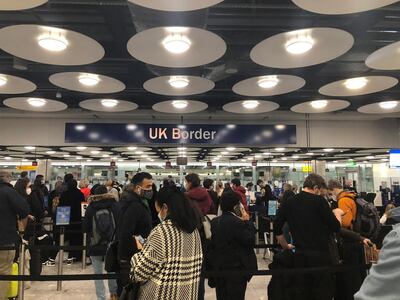UK ministers are drawing up plans for mandatory hotel quarantine for international arrivals amid concern new strains of Covid-19 could jeopardise the country’s vaccination campaign.
Boris Johnson said the government was “definitely looking at” setting up compulsory quarantine at the border for travellers arriving in the UK.
He will reportedly make a decision on the plan on Tuesday after the policy is debated at the Cabinet’s Covid operations meeting.
Ministers will decide when and how long to introduce hotel quarantine, and whether the UK should completely shut its borders to non-citizens, as Australia and New Zealand did last March.
They will also decide whether to impose hotel quarantine only on arrivals from countries with new strains of the virus.
What is hotel quarantine and who pays?
Hotel quarantine is a 10-day period of managed isolation in an approved facility overseen by authorities.
The UK government is currently weighing up whether to bring in compulsory quarantine at the border for all new arrivals in the UK. Under the scheme, all those entering the country would be forced to pay for their own quarantine in a hotel selected by the government, covering the 10-day incubation period of the virus.
Chancellor Rishi Sunak, Home Secretary Priti Patel and Health Secretary Matt Hancock are among those understood to be pushing for hotel quarantine.
However, other ministers are pushing for a slimmed down quarantine that would only be imposed on travellers from countries with mutant strains of the virus that could pose a threat to vaccine efficacy.
Transport Secretary Grant Shapps, who is concerned about the impact on the travel industry, only wants the new restrictions imposed on travellers from high-risk countries, The Times reported.
Ms Patel is understood to want mandatory quarantine imposed on all arrivals to protect the UK from unidentified strains of the virus, arguing that some countries do not have adequate genome sequencing capabilities.
Mr Hancock on Sunday warned that the UK “can’t risk the progress we have made” in tackling coronavirus, adding “we have got to be cautious at the borders.”
How would hotel quarantine work?
Travellers would be bussed from the airport to government-approved accommodation around the country.
Passengers would not get to decide which hotel they stay in and may need to test negatively for the virus at the end of the 10-day isolation period to be allowed to continue their journey.
Limited hotel availability near airports could mean that passengers are transferred to hotels elsewhere in the UK to wait out the 10-day quarantine. For example, it is understood there are only about 10,000 rooms close to Heathrow Airport, which is about the same number of people arriving in the country per day.
Will Britons be exempt from hotel quarantine?
Britons may not be exempt from the scheme if it applies to all incoming arrivals to the UK.
If it applies to British nationals, it could be the final straw for the travel industry, with the suspension of the UK's travel corridors already harming the number of people choosing to go abroad.
Travelling abroad could be considered too expensive and difficult for Britons if they are forced to stay in a hotel on their return to the UK.
Mr Hancock said last week that Britons should consider a “great British summer”, indicating that the country should plan a domestic holiday this year.
Could the UK completely shut its borders?
An Australian-style shutdown of borders is among the stricter quarantine measures being considered by the government.
Under that arrangement, only citizens would be allowed to enter the country and complete their 10-day hotel quarantine.
A full shutdown would likely require the government to launch a repatriation mission for its overseas visitors, costing tens of millions of pounds.
Australia and New Zealand, which implemented full border closures after the pandemic hit Italy, are both cited as coronavirus success stories.
However, the border closure and cap on arrivals forced all but a handful of airlines to stop flying there.
The result is that thousands of Australian and New Zealand citizens remain stuck overseas, unable to return home because of limited flight availability.
What has Boris Johnson said?
Mr Johnson said on Monday he was looking at toughening the UK’s border controls because of the risk of "vaccine-busting" new variants of the coronavirus.
"We have to realise there is at least the theoretical risk of a new variant that is a vaccine-busting variant coming in - we've got to be able to keep that under control," he said.
"We want to make sure that we protect our population, protect this country against reinfection from abroad. We need a solution.”
He said the government was looking at the option of quarantine hotels but that the UK had one of the tightest regimes in the world.
"That idea of looking at hotels is certainly one thing that we are actively now working on," he said.
















